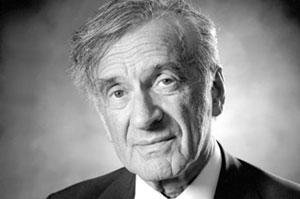Elie Wiesel was born in Sighet, Romania, on September 30, 1928.
A Nobel Peace Prize winner and Boston University professor, Wiesel has worked on behalf of oppressed people for much of his adult life. His personal experience of the Holocaust has led him to use his talents as an author, teacher, and storyteller to defend human rights and peace throughout the world.
A native of Sighet, Transylvania (Romania, from 1940-1945 Hungary), Wiesel and his family were deported by the Nazis to Auschwitz when he was 15 years old. His mother and younger sister perished there, his two older sisters survived. Wiesel and his father were later transported to Buchenwald, where his father died.
After the war, Wiesel studied in Paris and later became a journalist in that city, yet he remained silent about what he has endured as an inmate in the camps. During an interview with the French writer Francois Mauriac, Wiesel was persuaded to end that silence. He subsequently wrote La Nuit (Night). Since its publication in 1958, La Nuit has been translated into 30 languages and millions of copies have been sold. In Night, Wiesel describes his experiences and emotions at the hands of the Nazis during the Holocaust: the roundup of his family and neighbors in the Romanian town of Sighet; deportation by cattle car to the concentration camp Auschwitz-Birkenau; the division of his family forever during the selection process; the mental and physical anguish he and his fellow prisoners experienced as they were stripped of their humanity; and the death march from Auschwitz-Birkenau to the concentration camp at Buchenwald.
In 1978, President Jimmy Carter appointed him Chairman of the President's Commission on the Holocaust. In 1980, he became Founding Chairman of the United States Holocaust Memorial Council. Wiesel is also the founding president of the Paris-based Universal Academy of Cultures. Wiesel's efforts to defend human rights and peace throughout the world have earned him the Presidential Medal of Freedom, the United States Congressional Gold Medal and the Medal of Liberty Award, the rank of Grand-Croix in the French Legion of Honor, and in 1986, the Nobel Peace Prize. He has received more than 100 honorary degrees from institutions of higher learning.
Three months after he received the Nobel Peace Prize, Elie Wiesel and his wife Marion established The Elie Wiesel Foundation for Humanity. Its mission is to advance the cause of human rights and peace throughout the world by creating a new forum for the discussion of urgent ethical issues confronting humanity.
His more than 40 books have won numerous awards, including the Prix Medicis for A Beggar in Jerusalem, the Prix Livre Inter for The Testament, and the Grand Prize for Literature from the City of Paris for The Fifth Son. The first volume of Wiesel's memoirs, All Rivers Run to the Sea, was published in New York (Knopf) in December 1995. The second volume, And the Sea is Never Full, was published in New York (Knopf) in November 1999.
Elie Wiesel has been Distinguished Professor of Judaic Studies at the City University of New York (1972-1976), and first Henry Luce Visiting Scholar in the Humanities and Social Thought at Yale University (1982-1983). Since 1976, he has been the Andrew W. Mellon Professor in the Humanities at Boston University where he also held the title of University Professor.
He passed away at the age of 87 on July 2, 2016 at his home in Manhattan.




 2:23
2:23